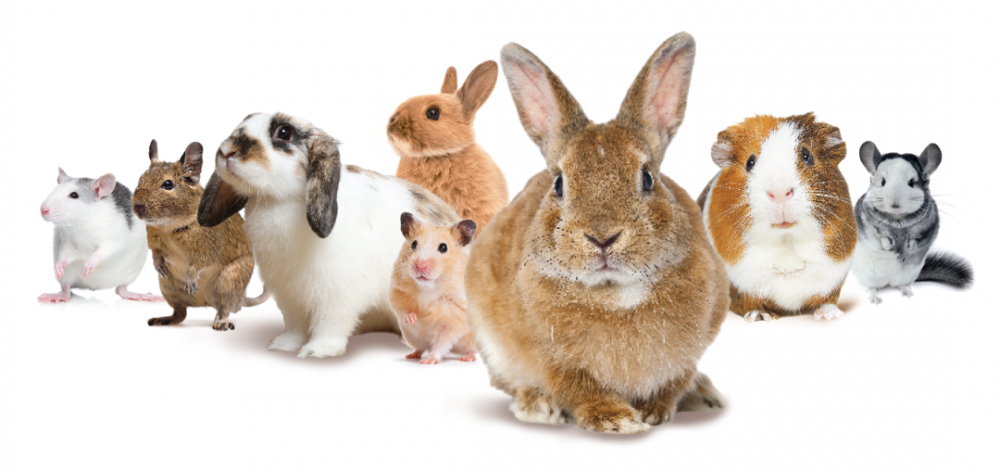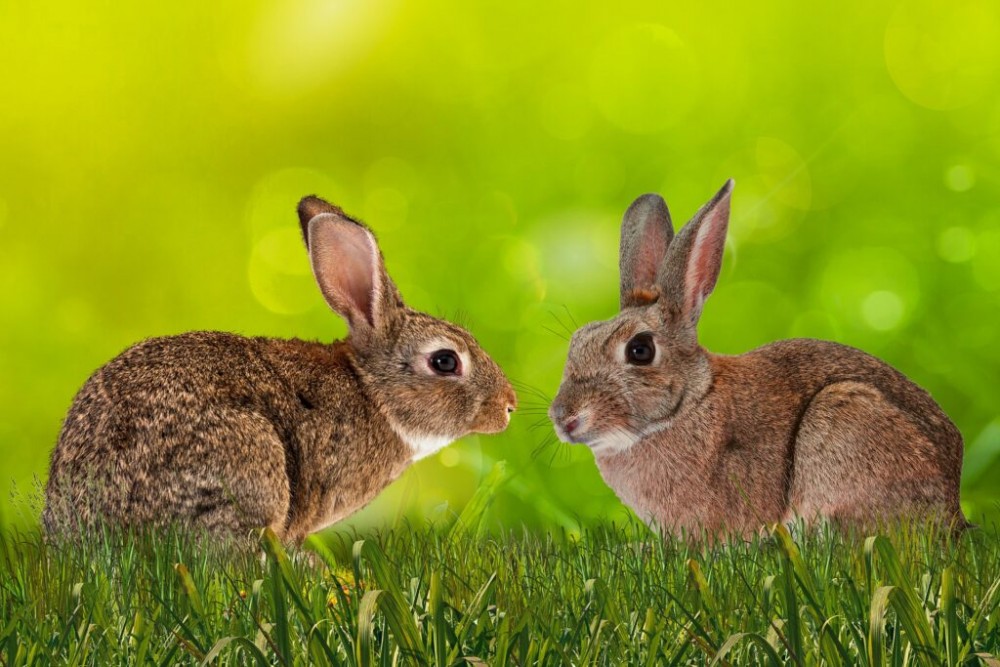Dental and oral diseases in small mammals
Dental problems in small rodents are more common than you might think. These animals often suffer in silence and mask their symptoms. Early detection of problems such as overgrown teeth can prevent serious health complications.
Symptoms of tooth problems
Small rodents such as rats, mice, hamsters, gerbils, guinea pigs or rabbits often struggle with dental problems. These problems range from poorly erected teeth to periodontal disease, and understanding them can help in better care and treatment. The onset of dental problems in small rodents can be both gradual and sudden. In some cases, small rodents show no clinical signs of oral disease. We therefore recommend that their oral cavity is examined regularly.
One of the main signs to look out for in a rodent is irregular eating patterns. Teeth problems can lead to chewing difficulties, weight loss, and even malnutrition.
Symptoms of dental disease in small rodents
- changes in dietary habits
- low food intake
- weight loss
- preference for soft foods (e.g. vegetables, fruit)
- loss of food from the mouth
- drooling, wet chin or moist muzzle area
- facial asymmetry
- rough coat
- halitosis
- change the size and appearance of the cutters
Regular annual veterinary examinations are essential to maintain a healthy rodent oral cavity. If you notice any abnormalities, do not hesitate to seek professional veterinary help.
Dental disease in rabbits
Malocclusion (poor positioning) of the incisors is a widespread problem in rabbits. The incisors of rabbits are constantly growing, 2-3 mm per week. When eating, chewing or gnawing, animals naturally grind them down. However, when these teeth are poorly positioned, they do not wear properly, leading to elongation that can interfere with food intake and cause pain. Shortening or filing the overgrown incisors can help. Shortening the incisors with forceps is absolutely inappropriate. In some cases the incisors must be pulled out.
Monitoring and regular checks of rabbit incisors are essential to prevent serious complications in time.
The recommended treatment for early detection of dental disease in rabbits includes a range of treatments from a conservative approach by modifying the diet and eliminating poor eating habits, to regular correction of overgrowing teeth at 4- to 6-week intervals, depending on whether the overgrowth is due to inadequate chewing and tooth grinding or whether the cause is metabolic bone disease in the animal. However, dietary management is necessary in either case.
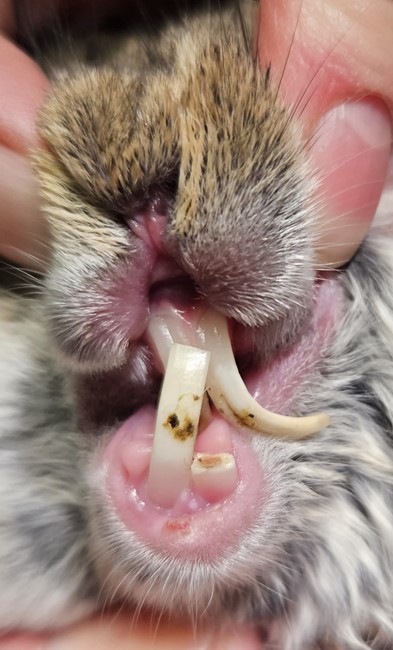 Overgrown and broken teeth in rabbit
Overgrown and broken teeth in rabbit
Sharp overgrowth of cheek teeth in rabbits
Throughout their lives, many rabbits suffer from curved cheek teeth that grow into sharp points that injure the tongue and/or cheek mucosa. These sharp spikes are a source of significant pain and discomfort to the rabbit and their removal results in virtually instant relief. In this case, however, any treatment is only palliative as irreversible changes in the shape of the affected teeth have already occurred. These spikes quickly regrow as the rabbits' teeth continue to grow. Once a tooth has been crooked, in most cases it will never straighten again. Unlike malocclusion of incisors, extraction of cheek teeth is very difficult and the procedure requires a CT scan.
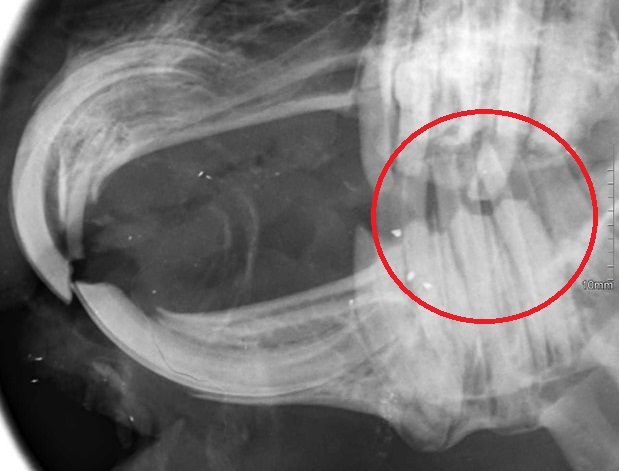 Sharp tips of cheek teeth in rabbit
Sharp tips of cheek teeth in rabbit
Treatment of mobile teeth in rabbits
When treating an animal under anaesthesia, we also check during the procedure if any teeth are loose. Increased tooth mobility can be the result of bone loss, infection or a fractured crown. Such teeth should be extracted.
Periodontal disease in rabbits
It is a disease of the hinge apparatus of the tooth, which occurs most often as a result of secondary infection after exposure of a broken crown and/or an impacted foreign object.
Periodontal disease is caused by a bacterial infection of the gums and the structures that support the teeth. Symptoms include bad breath, inflamed gums and tooth loss. Poor dental hygiene and diet often contribute to this condition. You can prevent periodontal disease by providing your rodent with a balanced diet and proper chewing materials. Treatment may include antibiotics and dental cleanings performed by a veterinarian. Regular dental hygiene is essential to prevent this disease.
Dental injuries in rabbits
Dental injuries in rodents are most commonly caused by rabbits falling on hard surfaces, chewing on cage wires, rabbits fighting with each other or chewing on very hard objects. This can result in fractures or knocked-out teeth. If a tooth is loose or broken, the rabbit suffers pain with not being able to take food properly. In these cases, immediate veterinary intervention is necessary.
Fractures of the lower incisors
If, for example, the lower incisors have been broken and were in a normal shape and position before the accident, it is important to keep them shortened and regularly shape them to the desired position to the opposing incisors of the upper jaw until the broken teeth begin to erupt naturally. Otherwise, acquired malocclusion (poor tooth position) could result.
Fractures of the cheek teeth
Cheek fractures are a more serious problem than incisor fractures as they can result not only in malocclusion but also in periapical infection and abscesses. These fractures require close monitoring. Fracture of the cheek teeth can occur as a result of trauma or biting hard objects. Avoiding giving very hard objects to chew can help minimize the risk of cheek tooth fractures.
Fractures of the jaw
Jaw fractures in rabbits may be the result of periapical infection and abscess formation or the result of trauma.
Feeding rabbits with diseased teeth or oral cavity
Once rabbits start having problems with their teeth or oral cavity, they will never have healthy dentition and subsequent treatment is only palliative. However, management of secondary problems can significantly improve the lives of affected rabbits.
Watch out for the hay
Rabbits with dental disease often cannot or will not accept hay, which puts increased pressure on the innervation of their teeth, so offer a softer, fibre-rich food. Green leafy plants and vegetables are a good source of fibre. Meadow plants are suitable, especially for rabbits that have the option of grazing in an enclosure. They often prefer dried or fresh grass to hay as it is softer. Avoid feeding muesli mixes and limit the feeding of extruded mixes and pelleted food. Muesli not only plays a large role in the development of gum disease in rabbits, but also contributes to obesity and other health problems. Therefore, only give them a small amount of pelleted or extruded food once a day.
Green feeding
Give rabbits with bad teeth a wide variety of green foods, plants and vegetables twice a day. For example, you can feed basil, coriander, mint, parsley, carrot leaves, dandelion, cauliflower leaves, fennel, spinach, broccoli leaves, cabbage, Chinese cabbage, kale or watercress.
Fruit and root vegetables should be fed to rabbits in limited quantities as these contain very little indigestible fibre and are energy rich. They are also often the cause of soft cecotrophs. Examples include apples, pears, bananas, carrots, parsnips, beets or celery.
Feeding rabbits with missing incisors or with incisors with malocclusion
These rabbits are unable to take a bite out of food such as an apple or carrot. However, they can use their tongue and lips to move pieces of food towards their cheek teeth. If the cheek teeth are healthy and the food reaches them, the rabbit is able to chew the food into smaller pieces before swallowing it. A rabbit with maloccluded incisors therefore needs to have its food cut into smaller pieces, but is able to eat hay and other fibre-rich foods.
Feeding rabbits with advanced dentition disease
Missing tooth crowns or an abnormal bite interfere with the ability to grasp and chew food. The affected individual may therefore take longer to eat. Also, they may not take in enough food, which then leads to weight loss.
Rabbits with advanced gum disease often cannot consume hay. Their teeth are not sharp enough to cut the hay into smaller pieces. Therefore, they can usually only accept the green leaves of plants. Harder foods such as kale or broccoli should be cut into smaller pieces beforehand.
With advanced dental disease, food intake becomes a more serious problem as the rabbit lacks tooth crowns and tooth contact surfaces for chewing. Food intake such as hay and hard food is virtually impossible. Extruded food can provide them with energy to survive, but it must be given softened with water. Although fruit is not suitable for rabbits as it contains little indigestible fibre, such affected animals can be given treats such as small pieces of banana or apple. It is important to monitor the weight of the rabbit. Pellets, mixed muesli and soft foods such as fruit and energy-rich sweet rewards can lead to obesity. In this case, the amount of food given should be limited. Accepting food without functional teeth is difficult and some rabbits can only thrive with regular syringe feeding by the owner. Crushed pellets or special feed mixes designed for convalescence can be used.
Dental diseases in guinea pigs and chinchillas
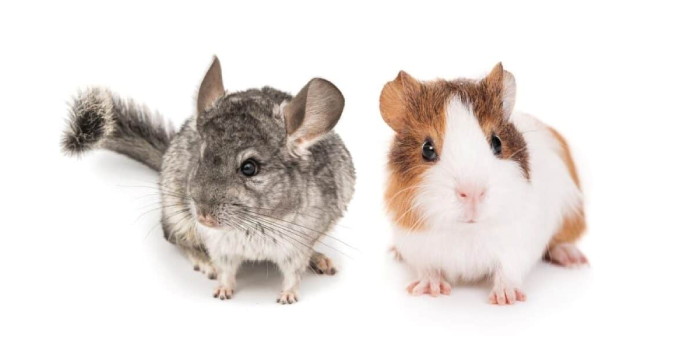
Dental disease is one of the most common health problems in guinea pigs and chinchillas.
Common causes of malocclusion in guinea pigs are diets low in fibre or vitamin C, infections or injuries. Malocclusion of the incisors is manifested as excessive overgrowth or sideways protrusion of the lower crowns of the incisors. Malocclusion of the incisors occurs mainly due to primary disease of the cheek teeth. In guinea pigs, the upper incisors do not tend to curve and grow towards the upper palate as in chinchillas.
Guinea pigs with dentition often suffer from other diseases. A suitable diet rich in indigestible fibre and vitamin C is most important in prevention.
Reasons for seeking professional veterinary help include eating disorders, difficulty in rumination, reduced food intake or emaciation associated with inappetence.
Guinea pigs are often kept in groups. It is therefore difficult for breeders to identify an individual suffering from inappetence, so the only sign of illness is emaciation. In guinea pigs, the symptoms of dental disease are more specific than in rabbits, for example, as guinea pigs are not able to mask the disease and hide its symptoms as much.
Overgrown incisors in a guinea pig
Similarly to rabbits, excessive crown overgrowth and malocclusion of the cheek teeth occurs very often in guinea pigs, but in a different way.
In guinea pigs, the crowns of the cheek teeth of the lower jaw tend to grow towards the tongue and the crowns of the cheek teeth of the upper jaw grow towards the cheek. Their overgrowth only occasionally results in sharp points as in rabbits. In guinea pigs, the overgrowth of the lower jaw cheek crowns in the terminal phase of the disease completely overwhelms the tongue and thus 'traps' it. The sharp edges of the entire arcade of upper cheek teeth can then cause damage to the cheek mucosa. Even very early malocclusion and subsequent damage to the contact surfaces of the teeth leads to manifestations of inappetence and associated weight loss in guinea pigs.
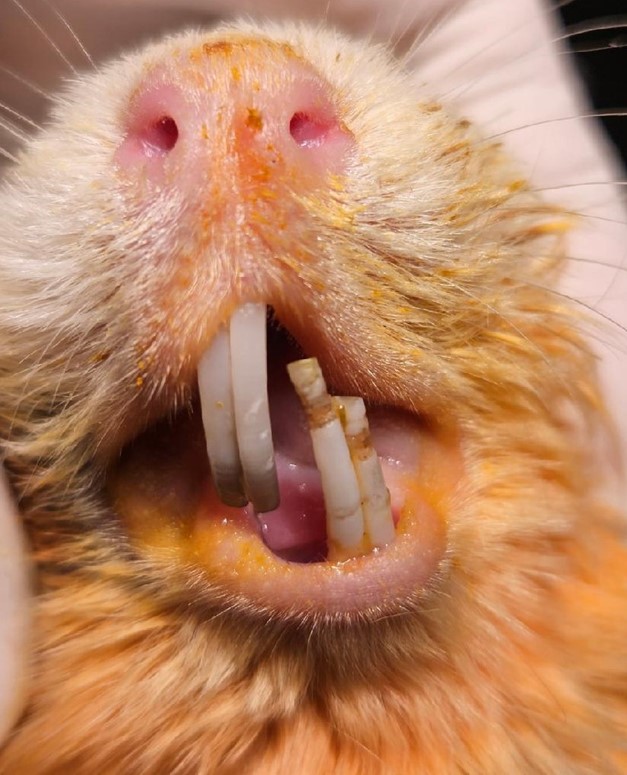
Overgrown incisors in guinea pig
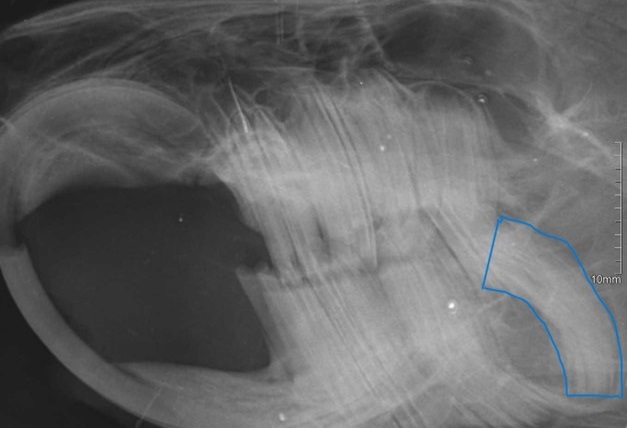
Abnormally localized last cheek tooth of the lower jaw predisposes the guinea pig to disease - e.g. abscess of the lower jaw
Overgrowth of teeth in chinchillas
In chinchillas, the overgrowth of the cheek crowns of the lower jaw is not as pronounced as in guinea pigs. Excessive crown overgrowth leads to root deformities of the affected teeth, both in the upper and lower jaw. The typical manifestation is a rigid palpable swelling of the lower jaw. Root deformities can lead to perforation of the jaw bone, which leads to exposure of the root tip of the affected tooth.
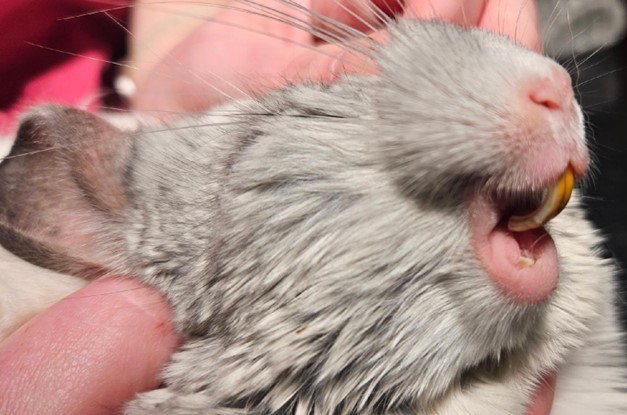
Overgrown upper incisors in chinchilla
Dental problems in other small mammals
Mice, rats, hamsters and gerbils can have any of the above incisor abnormalities, from mild to severe forms. The most common are slightly overgrown or broken incisors of the lower jaw and curved incisors of the upper jaw. Secondary lesions occur on the tongue, mucous membranes and palate, where perforation of the upper palate and communication between the oral cavity and the nasal cavity, the so-called oronasal fistula, sometimes occurs.
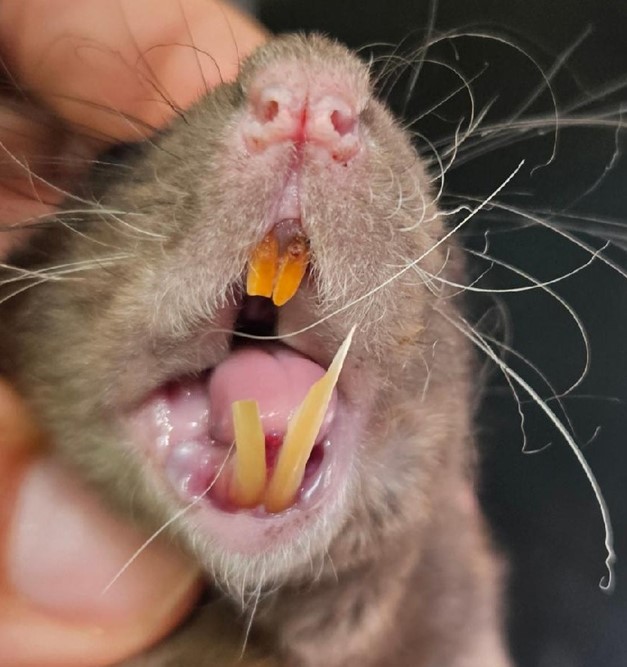
Overgrown upper incisors in rat
Prevention of dental and oral diseases in small mammals
Regular health check-ups
Regular visits to the vet are essential to monitor the condition of your pet's teeth. During these visits, a thorough dental examination is performed to detect early signs of problems such as malocclusion and overgrowth. Early detection of these problems can prevent more serious complications. You should also check your pet's teeth at home for visible signs of wear, abnormal growth or bleeding from the mouth. Routine monitoring helps catch problems before they escalate, allowing for early intervention. By following these guidelines, you can greatly improve your small rodent's dental health and overall well-being.
Warning: This article is for information only and does not replace professional consultation or examination of the animal by a veterinarian. If you have any doubts about the health of your pet, contact your veterinarian immediately.
01.01.2025

